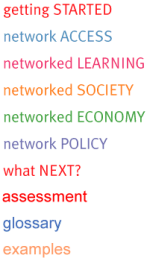|
How some communities in the developing
world are putting information and communication technologies to use:
Information and communication technologies
are tools with myriad potential applications. What follows are a few
illustrations of creative and effective uses of ICTs. We are not endorsing
these projects and cannot guarantee that the synopses are accurate.
| Grameen
Phone’s Village Pay Phone project helps Bangladeshis
without financial collateral to provide telecommunications
services to their communities. They purchase mobile phones via
lease, and pay for their investment by allowing villagers to make
calls and send and receive messages. In time, other services such
as email and fax will also be available.
The initiative has shown that poor rural residents value
telecommunications and are in fact willing to pay fair (and
sustainable) prices for telecoms services. In addition to
providing access for the community, the phones create
microenterprises. Furthermore, by employing mobile phones that can
be used anywhere in the community, problems arising from the
location of fixed community phones have been largely avoided.
URL: http://www.grameen.org
|
|
Adesemi Communications International is providing the first
reliable, quality phone service in Tanzania through the Adesemi
Payphone concept. They have installed durable user-friendly units,
capable of connecting local, long distance and international
calls.
Their wireless system allows the flexibility to install
payphones where they are most needed, regardless of whether
landlines exist. Instead of using coins, users can purchase
Adesecards in denominations as small as 45 cents. Minimizing
vandalism and maximizing theft protection, these cards have proven
far superior to coins.
Small businesses that are heavily dependent upon communications
for their commercial viability, such as taxi dispatchers, have
reaped tremendous benefits. The company is planning to add
Internet connectivity to its phones and is expanding its
operations elsewhere in Africa, and to Latin America and Southeast
Asia.
URL: http://www.adesemi.com
|
|
Red Cientifica Peruana, located in Peru, is completely
self-sustaining, receiving no subsidies, governmental or
otherwise. RCP has successfully set up a national network of 27
telecenters in Peru, which typically consist of 20 desktop
computers with dedicated Internet access. The telecenters provide
computer rentals, training, personal email accounts, World Wide
Web page development and other services.
What is most notable about RCP is its successful business
model. They have devised a fee structure that covers costs and
allows their organizations to grow while retaining profits.
Additionally, RCP has become the largest provider of Internet
access in Peru and the country’s most popular portal with 20,000
hits per day (85% foreign).
RCP recently signed an agreement with the US investment fund
Westsphere to form a new communications company, dedicated to
expanding current Internet services, with plans to expand into
long distance telephony and television programming.
URL: http://ekeko.rcp.net.pe/
|
|
Chennai Interactive Business Services has developed an
English-language web portal offering a wide range of local content
directed at residents and potential visitors of Chennai, India
(formerly known as Madras). The expansive portal receives over
10,000 visitors daily hits and provides information on everything from
recipes to railway reservations, from links to government agencies
to lists of government tenders.
CIBS also has what it calls the only Tamil language e-zine,
covering a variety of different issues, and appealing primarily to
the dispersed Tamil Diaspora. It uses technology to support the
perseverance of this ancient language and maintain ties with
community members long since emigrated.
URL: http://www.chennaionline.com/
URL: http://www.aaraamthinai.com/
|
|
Centro Comunitario Internet El Encuentro, Chile’s first
community Internet center, is located in Penalolen, an
economically disadvantaged area of Santiago. By providing the
opportunity to learn about computers and the Internet and access
to them, CCI El Encuentro hopes to promote personal, social and
economic development in its community. In addition to listing
contact information for local microentrepreneurs, it transmits the
community radio station over the Internet, and hosts other local
social development groups.
Not satisfied by fostering production and dissemination of
local content by the information have-nots, CCI El Encuentro also
hopes to become a link between the community and government,
especially as it continues to initiate new forms of e-government.
URL: http://www.elencuentro.cl/
|
|
Thanks to modern technology, 1400 people from Turkey to Great
Britain to Thailand, are sharing ideas in an on-line forum called
The Global Knowledge for Development Discussion List (GKD).
Participants come from governments, universities, NGOs and local
community members in 90 countries, more than half of which are in
the developing world. Through real-time virtual chats, GKD has
allowed participants to make global friends and partners, and to
help in the fight to make information universally available and
well utilized.
URL: http://www.globalknowledge.org/tales/virtuallythere.html
|
|
PEOPlink is a non-profit organization that helps artisans
in developing countries sell their products over the Internet. The
PEOPlink website features many artisans’ products, permitting
remotely located customers to browse and purchase them online.
Business is conducted directly between producers and consumers,
and avoids the expense of a middleman. Email enables consumers’
requests to be relayed directly to the artisans, thus allowing
them to better know their distant and culturally distinct market,
and to adapt their products accordingly. Many rural women’s
groups have found gains in self-confidence and a new desire to use
technology in their daily lives. Only a minimal amount of local
bandwidth is required so PEOPlink does not need the top notch
infrastructure unavailable in most rural areas.
URL: http://www.peoplink.org
|
|
It is becoming possible to split up parts of the business
process in ways that were never possible before, gaining new cost
savings and efficiencies. InterLink Communications provides
offshore medical transcription services to the U.S. healthcare
industry from its facilities in India.
Doctors dictate their notes, and the recording is digitized,
compressed and sent via the Internet to India, where workers who
have been extensively trained in anatomy, medical terminology, and
American diction transcribe the recording into text. The time
difference allows return of the resulting transcriptions overnight
at a lower cost.
URL: http://www.iclnet.com
|
|
As part of its Twin Cities Network Services (TWINS)
initiative, the Government of Andhra Pradesh State in India
recently inaugurated the first Integrated Citizen Service Centre.
Not only does the ICSC place the citizen interface for 18 services
from twelve government departments under one air-conditioned roof,
it actually allows all services to be delivered from any desk in
the building. Services include payment of utility bills and taxes,
registration of births, issuance of driving and vehicle licenses,
and information on government procedures.
URL: http://www.andhrapradesh.com/
|
|
|


